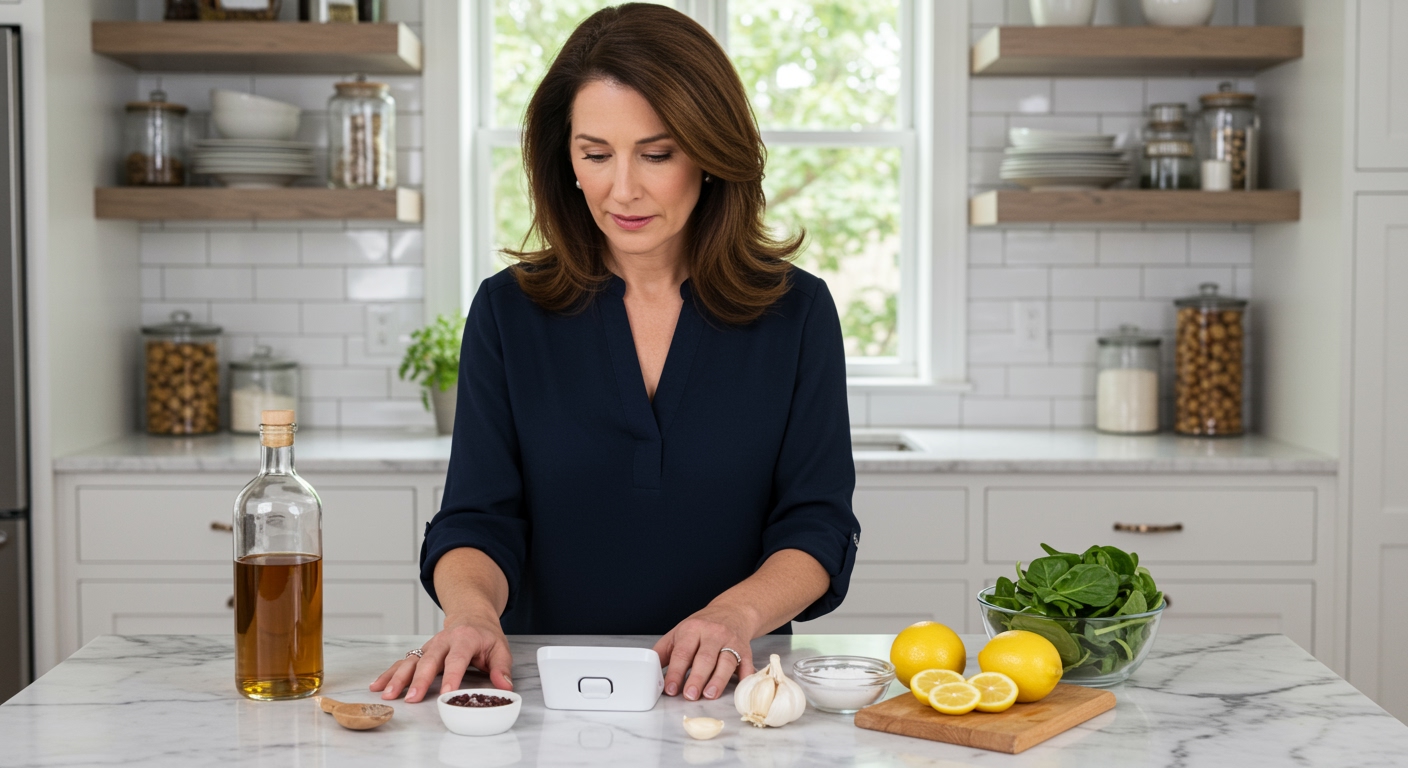✪ Key Takeaway: Vinegar may lower blood pressure further, making it potentially dangerous for people with hypotension.
Introduction
Your friend swears by apple cider vinegar for health, but you have low blood pressure and wonder if it is safe for you.
You might be asking this question because you have heard conflicting information about vinegar and blood pressure, or perhaps your doctor mentioned watching your diet more carefully.
Hi, I am Abdur, your nutrition coach, and today I am going to explain exactly how vinegar affects low blood pressure and what you need to know to stay safe.
How Does Vinegar Actually Affect Blood Pressure?
Vinegar contains acetic acid, which research shows can influence your cardiovascular system in several ways.
Studies indicate that regular vinegar consumption may reduce systolic blood pressure by 2-6 mmHg in some people.
The mechanism involves acetic acid potentially affecting your renin-angiotensin system, which regulates blood pressure throughout your body.
This system controls how your kidneys manage sodium and water balance, directly impacting your blood vessel pressure.
When you already have low blood pressure, any further reduction could push your readings into dangerous territory.
Normal blood pressure ranges from 90/60 to 120/80 mmHg, and readings below 90/60 are considered hypotensive.
✪ Fact: Even a 3 mmHg drop in blood pressure can cause dizziness and fainting in hypotensive individuals.
What Are The Risks For People With Hypotension?
Low blood pressure combined with vinegar consumption can create serious health complications that many people overlook.
Your brain needs adequate blood flow to function properly, and when pressure drops too low, you experience cognitive symptoms first.
These symptoms include dizziness, lightheadedness, confusion, and difficulty concentrating during daily activities.
More severe cases can lead to syncope (fainting), which increases your risk of falls and injuries.
Your heart may also respond by beating faster to compensate for low pressure, creating palpitations and chest discomfort.
Some people experience nausea, fatigue, and blurred vision when their blood pressure drops too low after consuming vinegar.
The timing matters too – consuming vinegar on an empty stomach may intensify these effects in sensitive individuals.
✪ Pro Tip: Monitor your blood pressure for 2 hours after consuming vinegar to track your individual response.
Are There Any Safe Ways To Use Vinegar With Low Blood Pressure?
If you want to include vinegar in your diet despite having low blood pressure, moderation becomes absolutely critical.
Start with tiny amounts – no more than one teaspoon diluted in a full glass of water with food.
Always consume vinegar with meals rather than on an empty stomach to slow absorption and minimize blood pressure effects.
Choose milder vinegars like rice vinegar or white wine vinegar instead of concentrated apple cider vinegar for gentler effects.
Monitor your symptoms closely for at least two hours after consumption, especially during your first few trials.
Consider using vinegar primarily for cooking rather than as a health supplement to limit your overall intake.
Never increase your vinegar consumption without first discussing it with your healthcare provider who knows your medical history.
✪ Note: People taking blood pressure medications should be extra cautious as vinegar may enhance drug effects.
What Should You Do Instead For Low Blood Pressure?
Focus on evidence-based strategies that safely support healthy blood pressure without the risks associated with vinegar.
Increase your sodium intake slightly through natural sources like sea salt, but consult your doctor about appropriate amounts first.
Stay well-hydrated by drinking 8-10 glasses of water daily, as dehydration worsens low blood pressure symptoms.
Eat smaller, more frequent meals to prevent postprandial hypotension – the blood pressure drop that occurs after large meals.
Include foods rich in vitamin B12 and folate, as deficiencies in these nutrients can contribute to low blood pressure.
Consider compression stockings if recommended by your healthcare provider to improve blood circulation in your legs.
Avoid standing up quickly and take time to adjust positions gradually to prevent sudden pressure drops.
✪ Pro Tip: Keep a blood pressure log to identify patterns and triggers that affect your readings throughout the day.
The Bottom Line
Vinegar is not a good choice for people with low blood pressure because it may lower your readings even further, potentially causing dangerous symptoms.
When you have hypotension, every drop in pressure matters more than you think – and the risks simply outweigh any potential benefits from vinegar consumption.
I would love to hear about your experiences with low blood pressure management or any questions you have about safe dietary choices in the comments below.
References
At NutritionCrown, we use quality and credible sources to ensure our content is accurate and trustworthy. Below are the sources referenced in creating this article:
- PubMed: Effects of apple cider vinegar on blood pressure
- K Health: Apple Cider Vinegar and Blood Pressure
- Cardiometabolic Health: Apple Cider Vinegar Diet Trick
- University of Chicago Medicine: Debunking the Health Benefits of Apple Cider Vinegar





